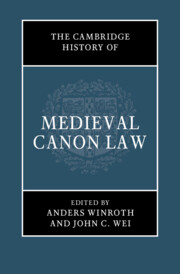Book contents
- The Cambridge History of Medieval Canon Law
- The Cambridge History of Medieval Canon Law
- Copyright page
- Contents
- Figures
- Maps
- Tables
- Contributors
- Acknowledgments
- Abbreviations
- Medieval Canon Law: Introduction
- Part I The History of Medieval Canon Law
- Part II The Sources and Dissemination of Medieval Canon Law
- Part III Doctrine and Society
- Iudicium
- Clerus
- 18 Ecclesiastical Property, Tithes, Spiritualia
- 19 The Law of Benefices
- 20 Religious Life
- 21 The Sacraments of Baptism, Confirmation, and the Eucharist
- 22 Confession, Penance, and Extreme Unction
- 23 Saints and Relics
- Conubium
- Crimen
- Conclusion
- Bibliography of Primary Sources
- Index
- References
22 - Confession, Penance, and Extreme Unction
from Clerus
Published online by Cambridge University Press: 13 January 2022
- The Cambridge History of Medieval Canon Law
- The Cambridge History of Medieval Canon Law
- Copyright page
- Contents
- Figures
- Maps
- Tables
- Contributors
- Acknowledgments
- Abbreviations
- Medieval Canon Law: Introduction
- Part I The History of Medieval Canon Law
- Part II The Sources and Dissemination of Medieval Canon Law
- Part III Doctrine and Society
- Iudicium
- Clerus
- 18 Ecclesiastical Property, Tithes, Spiritualia
- 19 The Law of Benefices
- 20 Religious Life
- 21 The Sacraments of Baptism, Confirmation, and the Eucharist
- 22 Confession, Penance, and Extreme Unction
- 23 Saints and Relics
- Conubium
- Crimen
- Conclusion
- Bibliography of Primary Sources
- Index
- References
Summary
The close links between confession, penance, and extreme unction may warrant discussing these topics together in a single chapter of a book on medieval canon law. For most of the Middle Ages, penance and canon law were closely related and at times even virtually indistinguishable, as the first section of this chapter will explain. This was so even though penance could take many different forms and shapes, ranging from very informal acts of penance more or less fueled by feelings of contrition, on the one hand, to disciplinary penances, which were formally imposed by priests, bishops, and ecclesiastical or even secular courts, on the other, as the second section of this chapter will argue. Confession, moreover, served from very early on as an intrinsic part of the rituals that prepared a Christian for his or her last voyage: the rites of extreme unction. The final part of this chapter will deal with the development of these last rites into a more or less defined liturgical ritual as it emerged in the Carolingian age and lasted through the centuries.
- Type
- Chapter
- Information
- The Cambridge History of Medieval Canon Law , pp. 421 - 436Publisher: Cambridge University PressPrint publication year: 2022

